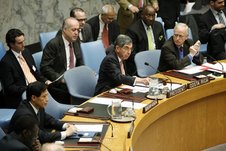| Organizers |


|
|
|
Dear
Friends and Supporters of Article 9,
Seasons Greetingss!
We
are pleased to send you some information about the Global Article 9
Campaign to Abolish War's recent activities and related developments. |
|
GLOBAL ARTICLE 9 CAMPAIGN'S LETTER TO THE UN SECURITY COUNCIL
 Under
the Presidency of Costa Rica, an unarmed nation, the Security Council
held in November an open debate on "strengthening collective security
and armament regulation," as part of an effort to re-invigorate and
re-energize work to implement Article 26 of the UN Charter. Under
the Presidency of Costa Rica, an unarmed nation, the Security Council
held in November an open debate on "strengthening collective security
and armament regulation," as part of an effort to re-invigorate and
re-energize work to implement Article 26 of the UN Charter.
Article
26 of the UN Charter challenges militarism and the assumption that
international relations and security can only be determined through the
threat of military force, calling instead for disarmament and the
reduction of military expenditures as a precondition for increased
security, development, and peace.
The text of the article reads as follow:
"In
order to promote the establishment and maintenance of international
peace and security with the least diversion for armaments of the
world's human and economic resources, the Security Council shall be
responsible for formulating, with the assistance of the Military Staff
Committee referred to in Article 47, plans to be submitted to the
Members of the United Nations for the establishment of a system for the
regulation of armaments."
Though
Article 26 gives the Security Council and the Military Staff Committee
the responsibility for enforcing disarmament and redirecting resources
away from military spending, the Council has so far neglected this task
entirely.
Civil society organizations welcomed the holding of
such debate, at a time when global military expenditures reach new
records. Under the leadership of WILPF, many NGOs seized this
opportunity to put pressure on the UN Security Council to comply with
Article 26 and bring concrete proposals and commitments to implement
this neglected instrument to reduce global spending on armaments and
refocus spending on human security needs towards sustainable
disarmament and sustainable development.
As
Article 9 of the Japanese Constitution supplements Article 26 of the UN
Charter, the Global Article 9 Campaign sent a letter to all UN Security
Council members, calling on governments to regulate armament, reduce
worldwide military spending and reallocate the world's limited
resources to sustainable development and peace promotion.
During
the debate, the five permanent members (namely the US, the UK, Russia,
China and France) did not concretely address the issues of Article 26,
reduction of military spending, or the regulation of armaments.
However, several other delegations expressly linked disarmament to
development, arguing against disproportionate spending on armaments and
for a better allocation of resources.
The
Presidentials Statement issued by the Council did not break any new
grounds. Though the text expresses concern with rising military
expenditures and calls on states to reinforce and implement existing
agreements, it fails to give a role to the Security Council for further
action on the implementation of Article 26, the regulation of armaments
or the reduction of worldwide military expenditures.
Read the GA9C's letter here.
Also read Costa Rica's Concept paper, here.
A summary of the debate, here.
And the UNSC Presidential statement released after the debate, here.
Photo Credit: United Nations/Paulo Filgueiras
Óscar Arias Sánchez (fourth from right), President of Costa Rica and
President of the Security Council for November, chairs a meeting on the
maintenance of international peace and security, as well as the
strengthening collective security through general regulation and the
reduction of armaments.
|
| OVER 100 COUNTRIES SIGN TREATY BANNING CLUSTER BOMBS
On
December 3, delegates from 107 countries met in Oslo to sign a treaty,
agreed upon in Dublin in May, that bans the use, production, transfer
and stockpiling of cluster munitions.
Dropped from the air or
fired from the ground, cluster munitions initially explode in the air
and release hundreds of "bomblets" or sub-munitions designed to explode
on impact. Yet, many do not detonate, leaving countless unexploded
ordnances that threaten civilians for decades after a conflict.
According to Handicap International, 98% of the victims are civilians,
and more than a quarter are children.
Despites the fact that the
world's largest cluster bomb makers and users (including the United
States, Russia, China, Israel, India and Pakistan) have objected to the
ban and refused to sign it, the Convention on Cluster Munitions
represents the most significant humanitarian and disarmament treaty of
the decade. According to Thomas Nash of the Cluster Munitions Coalition
(CMC), a network of over 300 NGOs from 80 countries, "it's only one of
the very few times in history that an entire category of weapons has
been banned." Moreover, it contains the strongest provisions for victim
assistance in international law.
Read the Conventions on Cluster Munitions, here.
|
| DOHA CONFERENCE FAILS TO IDENTIFY DISARMAMENT AS A SOURCE FOR FINANCING DEVELOPMENT
The
Second International Conference on Financing for Development was held
in Doha, Qatar from November 29-December 2, to "assess progress made,
reaffirm goals and commitments" made in Monterrey, Mexico in March
2002.
The 2002 Monterrey Consensus "resolved to address the challenges of
financing for development" and "to eradicate poverty, achieve sustained
economic growth and promote sustainable development." Yet, since 2002,
little concrete commitments have emerged for new approaches to
financing more equitable global development.
The
outcome document of the Doha Review Conference went beyond the 2002
Monterrey Consensus in some ways, notably on gender equality. However,
participating NGOs deplored the fact that it failed to decisively
address urgent and systemic issues underpinning poverty, and some
regret that it did not mention reduction of military budgets among
potential sources of development finance.
In
this regard, Costa Rican President Oscar Arias has been the only one to
focus on disarmament and to call for debt forgiveness and additional
aid for developing countries that spend more on human resources than on
the military.
 Watch the webcast of President Arias' speech here. Watch the webcast of President Arias' speech here.
|
CONTROVERSIAL JASDF MISSION IN IRAQ TO END
On November 28, the Japanese government formally decided
to withdraw Japan's Air Self Defense Forces (JASDF) from Iraq by the
end of the year.
Since 2004, JASDF have airlifted US forces' supplies and personnel to
and from Iraq. Though Japan had pulled out its Ground SDF troops from
Southern Iraq in July 2006, the JASDF mission has continued.
The UN Security Council mandate authorizing the deployment of US-led Coalition forces in Iraq expires on December 31.
In a historic ruling earlier this year, a Japanese High Appeal Court
declared the dispatch of Japan's Air Self-Defense Forces (JASDF) to
Iraq unconstitutional for it violates Article 9 of the Constitution
that bans the use of force. The government did not accept the court
ruling and its decision to terminate JASDF mission is therefore not
based on the court's judgment.
After ending the JASDF activities in Iraq, Japan's government hopes to
concentrate on its naval refueling mission in the Indian Ocean in
support of US-led operations in Afghanistan.
Japan's anti-war movement welcomes the decision to terminate the JASDF
mission in Iraq, but warns against redeploying forces to Afghanistan,
on the ground that since the Nagoya judgment ruled that the transport
of personnel and supplies to and from Iraq constituted "a key part of
combat in warfare", refueling warships in the Indian Ocean must also
represent an act of war.
The
Diet is, however, about to renew the bill authorizing the continuation
of naval refueling mission, despite widespread public opposition.
|
|
|
NEW ZEALAND'S BAND SINGS ARTICLE 9
 New
Zealand-based electronic/reggae band Rhombus released its new album,
whose last track, Article 9, is named after the article of the Japanese
constitution that renounces war. "That song is basically a protest
about people wanting to remove Article 9," explains the band's producer
Simon Rycroft. New
Zealand-based electronic/reggae band Rhombus released its new album,
whose last track, Article 9, is named after the article of the Japanese
constitution that renounces war. "That song is basically a protest
about people wanting to remove Article 9," explains the band's producer
Simon Rycroft.
The song was largely recorder onboard the Japan-based
global NGO Peace Boat, as members of the band joined the segment from
Jamaica to Hawaii of the around-the-world voyage.
The Article 9 beats saw the light somewhere between
Guatemala and Mexico, along with Japanese MCs using the instruments
available on board. The vocals were later recorded between San
Francisco, Hawaii and Tokyo.
Formed in 2001, the band has forged a reputation in New
Zealand, Australia, Japan and beyond, as it has performed with artists
from all over the world.
 Listen to the Article 9 song here. Listen to the Article 9 song here.
Click here to visit Rhombus' website.
|
Thank you for your interest in and support for the
Global Article 9 Campaign to Abolish War.
We wish you all the best for this holiday season and look
forward to continue working with you all in the coming year.
Peace,
|
Newsletter Editor:
Celine Nahory
International Coordinator
Global Article 9 Campaign to Abolish War / Peace Boat |
|
|